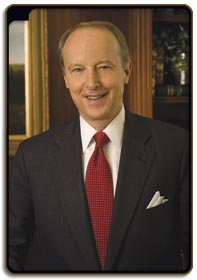Legal Writing Revised
A generous gift from David J. Beck, �65, establishes the David J. Beck Center for Advocacy and allows the Law School to make its legal writing program stronger

David J. Beck
Lawyers are writers. Whether writing a brief, composing a letter to a client, or researching and preparing a memo, lawyers must be able to use the written word effectively. But specifically teaching legal writing did not become common at most law schools until the 1970s and 1980s. The Law School currently requires first-year students to take two credit hours in legal writing and research, and also offers electives in writing subjects to second- and third-year students. And now, thanks to a generous gift from David J. Beck, �65, a founding partner of Beck, Redden & Secrest LLP in Houston and a nationally-renowned trial lawyer, the size of those classes has been reduced, allowing the UT Law faculty to devote more time and effective effort to teaching future lawyers the vital skill of writing well. �I could not have achieved any professional success without the education and support provided by the Law School,� said Beck. �It will be gratifying if my gift enables every graduate to leave the Law School with just a slight edge in the workplace based on the enhancements to the writing program.�
Last summer, Beck donated $2 million to the Law School to establish the David J. Beck Appellate Advocacy Center. The Beck Center will focus on strengthening the legal writing program at Texas by increasing the number of legal writing instructors, improving the quality of legal writing and research instruction, and establishing a first class appellate advocacy competition to be held annually. �The Law School owes David Beck an enormous debt of gratitude,� said Dean Larry Sager. �For this incredibly generous and important gift, to be sure, but also for the many ways David has supported UT Law School over the years--his service as a member of the UT Law School Foundation Board of Trustees, including four terms as its president, his leadership as the chair of our historic and ongoing capital campaign, and his remarkable career as a superb lawyer and civic leader which bring great credit to all of us at his law school.�
The Beck gift will make it possible for the Law School to double the number of its legal writing instructors, resulting in a dramatically-improved teacher to student ratio and allow the instructors to devote more time to teaching each of their students the fundamental skills of legal writing and research. Before the Beck gift allowed the hiring of four additional instructors, each legal writing class consisted of approximately one hundred students. Now instructors teach half the number. �Each teacher has fifty students,� says Wayne Schiess director of the Law School�s legal writing program. �Two groups of twenty-five. Meeting with twenty-five students instead of fifty or one hundred is dramatically different. Students are more engaged.�
Stephanie Debrow, a third-year student, said she thinks the changes will be an immense help in allowing the faculty to be more effective and in training more highly-skilled lawyers. �I found it very easy to get lost in the shuffle of the large 1L writing classes,� she said. �I think the best thing about the advanced legal writing classes is that they provide you with the opportunity to get very specific individualized feedback on your writing.�